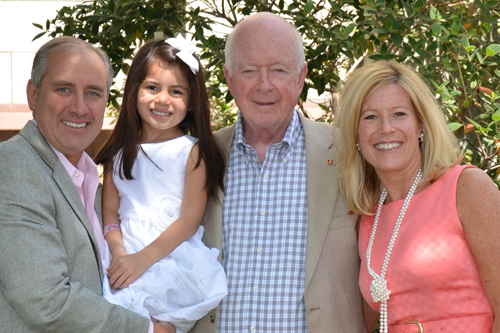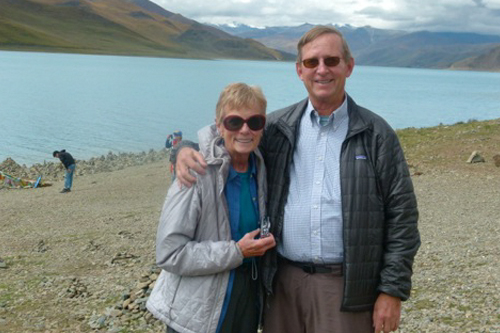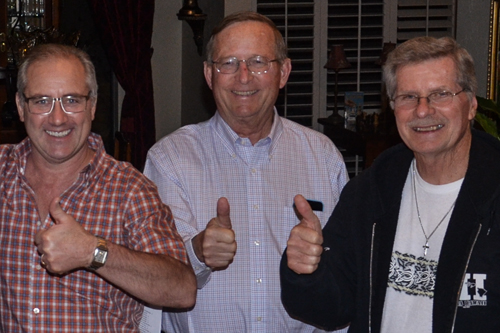Jim Steeb
Lauren Ward
Dr. Dana Weisshaar
Michele Steeb
Jim Swiger
Dr. Philip Oyer
How one woman’s heart gave Jim Steeb the gift of new life and new friendships.
Jim Steeb’s story
Am I worthy of this new heart?
The news I had been waiting for came around 9 p.m. on May 27, 2014: Doctors at Stanford, working with Kaiser Santa Clara and the National Organ Procurement and Transplantation Network, had found a heart for me. It was time for my transplant surgery.
I ran down the stairs of my in-laws' house as fast as I could manage. My wife Michele jumped up from her seat, and after a huge hug, we were on our way to the hospital.
Let me tell you: it’s a long, scary ride down the hallway to heart transplant surgery. I knew I had the love of my family, the support of friends, and the reassurance that I was in great hands with Stanford’s talented team of doctors, but I couldn’t help worrying if I would wake up in the morning.
Would I see my beautiful wife and kids again? Was I worthy of this new heart?
I thought back to the day this all started, less than a year before. I was at the gym training for a big race with Michele when I suddenly dropped to my hands and knees. I couldn’t breathe. I was dizzy, my right arm had fallen asleep and I was dripping in sweat.
At just 53 years old, I had suffered a massive heart attack — I was in utter disbelief. When I suffered my second heart attack just one month later, we knew something needed to be done and a team of doctors at Kaiser Santa Clara told me a heart transplant was the best option.
A year later, as I rolled down the hospital hallway, I closed my eyes and prayed for another day as a husband and father. I promised to make the most of the gift I had been given.
My support group and I sometimes talk about our donors, and I often think about the woman whose heart now beats inside my chest.
I wrote a letter to her family a few months ago. It was a very difficult letter to write — to put down in words my gratitude for this life, that’s not easy. She was just 48-years-old and I don’t know anything about the life she lived, but I hope her family understands the incredible gift she has given me: another day here as a loving husband and a proud father.
There are more than 123,000 Americans currently waiting for an organ transplant. 22,000 of those people live in California — that’s about 20% of all waiting patients. Source: donatelifecalifornia.org
Michele, Jim’s wife
The love of my life needed a new heart.
I’ve been a registered organ donor since I was 20 years old, but I never imagined I’d be personally affected.
My husband Jim was just 52 years old when he suffered his first heart attack. It was a warm Wednesday morning, June 26, 2013, and we were at the gym for an early workout. I usually don’t join him, but I’m so glad I did, because I was right there to dial 911 when he dropped to his hands and knees.
The few minutes it took the ambulance to arrive felt like a lifetime. The time spent in the hospital waiting room felt even longer. I knew something was wrong, but I was still floored when doctors told me he had suffered a massive heart attack.
This was Jim! My type-A, driven husband who was in the middle of training for a 10-mile race. You can imagine how shocked I was when Jim suffered his second heart attack just one month later and the doctors told us Jim needed a new heart.
Our life together has always been an adventure, but the past two years — with two heart attacks and a heart transplant — have been the biggest adventure by far.
We received the call that Jim was ready for a transplant about two months after his name was placed on the list, and we spent the next 17 days in the hospital.
I am so thankful for our amazing team of doctors who took excellent care of him — and for our support group. Jim has grown so close with this group of guys, all transplant patients, and I’ve developed a special bond with their wives. They sent me so many kind notes while Jim was in surgery.
Since Jim’s surgery, I’ve talked to many people about organ donation. I really believe it’s a conversation that every family should have. I know it’s not an easy conversation — no family wants to picture those circumstances. But as an organ donor, you have the chance to touch so many lives and make an unbelievable impact on the world.
I will forever be grateful for one woman, whose name I may never know, who gave my husband the gift of life.
My 6-year-old daughter and I pray for her and her family every night. We ask God to thank her for her gift and we send our best to her family. I know it wasn’t in her plan to leave this world so soon, but I see her light every day in Jim. And I hope her family understands just how thankful we truly are.
An average of 21 patients die every day while waiting, simply because the organ they needed was not donated in time. Source: donatelifecalifornia.org
Dr. Dana Weisshaar, Jim’s cardiac specialist
Treatment is just one part of a patient’s healing process.
One of my favorite traditions is the holiday party I host each year at Kaiser Permanente Santa Clara for my transplant patients and their families.
For me, it’s a joy to see my patients develop friendships with one another out of their shared experience. Going through a heart transplant is such a unique journey — it’s hard for people who haven’t gone through it to understand.
And it’s not just the patients. A transplant involves a patient and their physicians, of course, but it also involves spouses, children, parents, nurses, social workers, psychologists — the list goes on. It really does take the support of a whole community to give someone a second shot at life through organ donation.
I first met Jim Steeb and his wife Michele like I meet most of my other patients: after he developed severe heart failure and was not responding to medical therapy.
As the chief and medical director of the heart transplant program at Kaiser Permanente in Northern California, my job is to oversee pre- and-post-heart transplant care. Most of our heart transplants are performed at Stanford.
Despite Jim’s two heart attacks and the rapid progression of his heart disease, he remained incredibly positive. He and Michele had to come to grips quite quickly with just how sick he was. Accepting that a transplant was inevitable took faith and courage.
I truly believe that their positive attitude throughout the process helped Jim heal faster. Jim likes to claim that he holds the record as the only Stanford heart transplant patient to return to work in less than 60 days (which is pretty impressive), but in many ways, his recovery was aided by an incredible health team, and making the right decisions at the right times.
There’s no perfect course of recovery — life is full of hiccups. But Jim and Michele had the positive attitude and a supportive community that went a long way in speeding up the pace of getting back to daily life.
Did you know you can sign up to be an organ donor simply by checking “YES!” at the DMV when applying for or renewing your driver license or ID? Source: donatelifecalifornia.org
Dr. Philip Oyer, Jim’s transplant surgeon
I’ve been performing heart transplants for 40 years.
I’ve started every Friday the same way for nearly 40 years: gathered in a conference room with other doctors at 7:00 a.m., deciding who on our list of transplant candidates will receive a new heart.
One year ago, Jim Steeb was on that list — and just a few days later, I met him around the same time I meet most of my other patients: in the middle of the night.
Hearts need to be given to their new recipients right away, so most transplant surgeries happen in the middle of the night.
I completed my residency at Stanford in 1976 — incredible when you consider that just a few years before, heart transplant surgery was still in its infancy. Today, physicians perform this miraculous surgery as if it’s routine.
I’ve seen how how far science has taken us in such a short period of time.
After all, I’ve been performing heart transplant surgery longer than any other physician in the world.
60 years ago, it would have been unthinkable to remove an old heart and insert a new one. Today, thanks to the educated decisions and generosity of organ donors, people like Jim Steeb are able to stick around to witness more of life’s discoveries.
One person can save eight lives and enhance 50 others through organ and tissue donation. Source: donatelifecalifornia.org
Lauren Ward, Jim’s friend
This is the second chance I never expected.
At 68, I prepared myself to die. I was diagnosed with congestive heart failure, and at my age, with an incurable disease, I knew the odds of qualifying for a transplant were slim.
But then, unexpectedly, my doctors told me that I qualified for a new heart — and soon after I was on my way into surgery.
I know a lot of patients are scared as they roll into surgery, but I wasn’t afraid. Maybe it was all those years spent preparing myself for my last day, but I also knew that this was my second shot at life, a rare shot at life.
My operation was completed by 3:30 a.m, and by 8:30 a.m. that same morning, I was out of bed, sitting up, eating breakfast and chatting with my nurse. My wife and son couldn’t believe how well I was doing.
I credit a lot of my success of my recovery to Dr. Weisshaar, but also to the strong heart I was fortunate enough to receive: My donor was a single mother of one from Los Angeles, an ex-Marine who lost her life to a stroke.
Recently, I wrote a letter to her family. It was one of the most difficult things I’ve ever done, but I knew I had to for three reasons: to express my sympathy for their loss, to express my deep gratitude for their gift, and to reassure them that their daughter’s heart would be put to good use.
I’m really trying to make the most out of the second chance I never thought I’d get. I’ve met a great group of new friends, including Jim Steeb and other transplant patients, who have been a source of support.
I’m still spending a lot of time with my son and daughter. In fact, two months after my operation, I took my daughter duck hunting. I’m going to enjoy every moment I have with those kids because I understand how fragile life is — and I’m living every second of my second chance.
Donating an organ costs nothing to the patient or the family, and people of all ages and medical histories can sign up to be potential donors. Source: donatelifecalifornia.org
Jim Swiger, Jim’s friend
I think about my donor with each strong, new heartbeat
I struggled with cardiac problems for 28 years before I finally landed on Northern California’s list of heart transplant candidates. Doctors say that a patient has to be sick enough to land on the list, but healthy enough to survive the surgery — I prayed for a long time that my name would end up on that list.
My condition worsened before my transplant, and my wife and I worried whether a new heart would arrive in time to save my life. Thankfully, it did.
Prior to my transplant, I could barely walk 50 yards without having to take a break. Today, just nine months post surgery, I feel great. My quality of life has improved dramatically and I have stamina I haven’t felt in years. I’m finally able to celebrate milestones like birthdays, holidays, special events or sports games with my family and friends.
Part of that recovery has been helped by great friends like Jim Steeb, Lauren Ward, and our support group. We’re similar because we’re all transplant patients, but different because we come from various walks of life. We’re comfortable enough to just be ourselves, to share our successes and failures, anxieties and fears.
The lot of us often think about our donors and their families — it’s a regular conversation topic. I know I’m reminded of my donor and my donor’s family every day.
One day, I plan to share a detailed letter of my gratitude with the donor’s family. I’ve even started journaling my activities to show them what my recovery process looks like. I truly can’t thank them enough, and I want them to know that I’m thinking about my donor with each strong heart beat — in every activity I wasn’t able to do before.
You never know the impact you might have. Become a registered organ donor.Register Now




